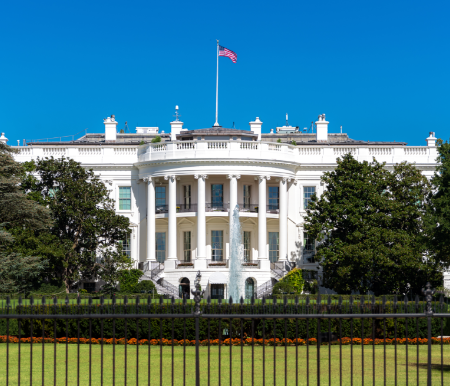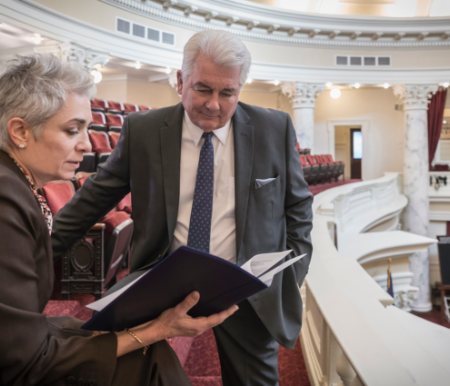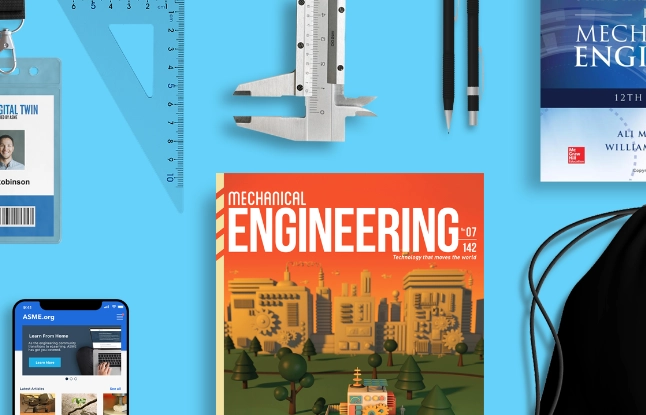Federal Government Fellowship Program
This premier program is an opportunity for selected ASME members to spend a year providing engineering and technical advice to government decision-makers in the nation’s capital.
About the ASME Federal Government Fellowship Program
ASME was the first engineering society to establish a Federal Government Fellowship Program. Since its inception in 1973, ASME's Fellows program has been used as a model for other engineering and scientific societies to develop their own fellowship programs. This program enables selected ASME members to devote a year to working in government, providing engineering and technical advice to policy makers in the U.S. Congress, the White House, and federal agencies. ASME’s Federal Government Fellowships provide a valuable public service to the nation while also giving engineers a unique opportunity to participate directly in the policy-making process. Previous fellows have described their year in Washington as the most exciting, rewarding, and educational period of their professional careers. This enriching experience enables fellows to bring back to their employers an insider’s perspective on government decision-making that can contribute significantly to the mission and vision of their organizations.
There are three types of fellowship programs available: Congressional, White House, and Federal
Applications are now Closed
Three Types of Fellowship Opportunities
Congressional Fellowships
Since 1973, ASME has sponsored the Congressional Fellowship Program to provide an opportunity for Society members to work with the U.S. Congress. As federal legislation becomes increasingly technical, the need for engineering expertise is essential. Congressional fellows participate directly in the lawmaking process and learn how the federal government operates. In addition, Congress is provided with necessary engineering expertise, and at the end of the fellowship year, a fellow's employer has an engineer with in-depth knowledge of congressional decision-making processes.

White House Office of Science and Technology Policy
Not Currently Accepting Applications
ASME placed our first Fellow at the Office of Science and Technology Policy in the Executive Office of the White House in 1981, giving ASME Members an exceptional opportunity to learn how the federal executive branch works while providing a valuable service to the nation. OSTP is provided with much needed engineering expertise, and the fellows gain both an inside view of the Executive Office of the President and first-hand knowledge of how decisions are made at the top level of our government. White House Fellowships are only available if Fellows are requested by OSTP.

Federal Agencies
Since the establishment of ASME's Federal Fellowship program, fellows have contributed their science and technology expertise to federal agencies throughout the executive branch. Click on this year's application for more information about agencies currently interested in hosting a federal fellow.

General Information
Who Should Apply
An ASME Federal Government Fellow must be a U.S. citizen and a member of ASME at the time of application. ASME members with the following credentials are particularly encouraged to apply:
- at least five years of professional experience
- advanced engineering degree
- public policy experience
Recruitment and Placement
Fellowship applications are accepted from ASME Members from November 1 through December 31. All applicants must be a member of ASME at the time of application.
ASME does not restrict applications of U.S. members who are Federal employees; however, many government agencies (including branches of the military services) have policies and programs in place regarding fellowships and may not support participation in non-governmental fellowship programs. Federal employees should investigate their organization's policies and processes before applying for an ASME fellowship.
Following successful selection as a fellowship candidate by ASME, all fellows are responsible for successfully passing an interview and being selected as a fellow by the designated government body (Congressional Office or federal agency). Fellows accept one-year assignments to work on the staff of a Member of Congress or a congressional committee. Fellows are not "employees" of Congress or of ASME, but they are treated as the equivalent of congressional staffers in terms of assignments and responsibility. Fellows should thoroughly research the issues and positions taken by Members of Congress and/or Congressional Committees before seeking placement.
Financial Support of ASME Federal Government Fellows
Congressional fellows are not employees of ASME or Congress, and do not receive a salary per se. Fellows will receive a competitive stipend throughout the duration of their fellowship and are eligible for relocation if they are moving to DC from out of state.
Because the stipend is not intended to be the fellow's entire financial support, the remaining salary and other costs, including benefits, must be negotiated between the fellow and his or her employer. If an applicant has complete financial support from his or her employer and will not require the ASME stipend, the selection subcommittee will consider sponsoring additional fellows. Society members selected for congressional fellowships typically take a one-year leave of absence from their employers. Special ethics rules will require a fellow to sever ties with his or her employer during the fellowship year.
Neither ASME nor Congress provides insurance or other benefits. Many employers find the Washington experience to be of value and will continue providing benefits. If you do not have benefits from an employer, you may wish to retain your own.
All applicants should be advised of the following:
ASME Fellows must move to Washington, DC, to serve their one-year Fellowship.
Acceptance of Position:
Following successful selection as a fellowship candidate by ASME, all fellows are responsible for successfully passing an interview and being selected as a fellow by the designated government body (Congressional Office or federal agency).
Board or Policy Committee Positions:
Fellows serving in a board or policy committee position with any organization that conducts outreach or advocacy to policy makers must discontinue such involvement for the duration of the fellowship.
Working on Federally Funded Grants and other Research Collaborations or Appointments:
Fellows may not be party to any federally funded grant applications, either as a PI, co-PI, or subcontractor. If a Fellow is already working on a federally funded grant, he/she must stop work on the grant for the duration of the fellowship and may not receive funding from the grant during that time. Fellows involved in other research collaborations or any appointment from which they receive additional remuneration must receive approval from their office/appropriate House or Senate Ethics Committee to continue that involvement. If the activity is not approved, the Fellow must take a hiatus from such involvement for the duration of the fellowship.
Contact Information
Anne Shaffer
Senior Manager, ASME Government Relations
1828 L Street NW, Suite 510
Washington, DC 20036
Email: nadlera@asme.org
Federal Fellows Program
Selected ASME members devote a year to working in government, providing technical advice to policy makers in Congress, OSTP, or other federal agencies.

Becoming an ASME Member
Joining ASME is the most important connection a current or future Mechanical Engineer can make.
